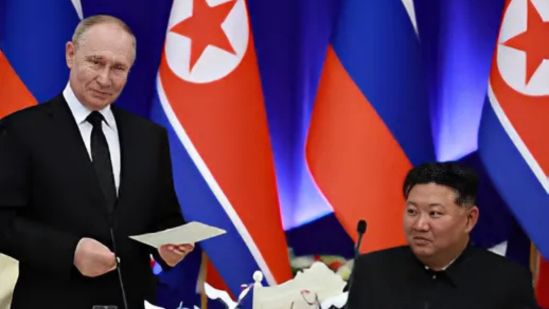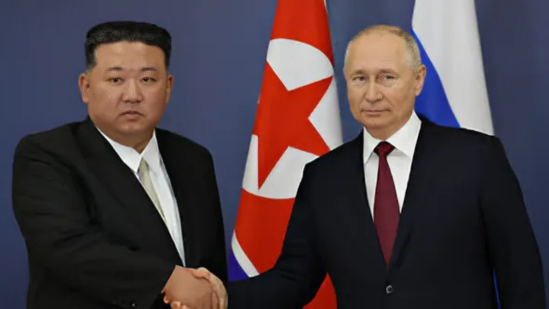
A recent intelligence report has raised alarm bells globally, revealing that North Korea is significantly increasing its military support to Russia. This alarming development includes the shipment of weapons, ammunition, and possibly missile technology to aid Russia in its ongoing war against Ukraine. Experts believe this growing military cooperation could have serious implications for both regional stability in Asia and the geopolitical balance worldwide.
According to the report, Western intelligence agencies have identified multiple instances where North Korean weapons have been used by Russian forces in Eastern Ukraine. These weapons include artillery shells, rockets, and small arms ammunition. Analysts say this development points toward a deepening alliance between two of the world’s most isolated and heavily sanctioned regimes.
The Historical Context of North Korea-Russia Ties
To understand this cooperation, it’s essential to look back at the long and complicated relationship between North Korea and Russia. During the Cold War, North Korea was heavily dependent on the Soviet Union for economic and military assistance. However, after the collapse of the Soviet Union in the 1990s, ties weakened considerably.
In recent years, especially after Western sanctions on both nations increased, North Korea and Russia have grown closer again. Isolated from much of the international community, both countries see value in supporting each other’s strategic and political ambitions. This mutual need for survival and resistance to Western influence is now driving their renewed partnership.
Key Revelations from the Intelligence Report
The newly published report has outlined several key aspects of North Korea’s military assistance to Russia. First and foremost, it states that Pyongyang has shipped large quantities of artillery and ammunition to Moscow. These supplies are believed to be used in ongoing combat operations in Ukraine, giving Russian forces a new stockpile to rely on as their domestic production faces challenges due to sanctions and the long duration of the war.
In addition, there is concern that Russia might be providing missile technology or technical expertise to North Korea in exchange for these supplies. Some sources have even suggested that North Korean scientists could be receiving help from Russian experts to advance long-range missile development and possibly even nuclear warhead design.
Transportation of these supplies is believed to occur through rail links between North Korea and Russia, particularly through the Russian Far East. There are also indications of maritime routes being used to avoid detection. Intelligence officials are closely watching port activities and rail cargo traffic to confirm the extent of the cooperation.
Global Response: Growing International Concern
The news of North Korea supporting Russia militarily has prompted strong reactions from multiple countries and international organizations. The United States has called the partnership “deeply destabilizing” and has urged the United Nations to investigate possible violations of international sanctions against North Korea.
The European Union has also expressed concern, stating that such actions only serve to prolong the war in Ukraine and increase civilian suffering. They have called for stricter sanctions enforcement and greater pressure on shipping companies and financial institutions that may be helping to facilitate this weapons trade.
South Korea and Japan, two nations already under constant threat from North Korea’s missile program, are particularly worried. They believe that the military backing from Russia could embolden North Korea to carry out more missile tests or even further nuclear advancements, which would be extremely destabilizing for the region.
Why Is North Korea Helping Russia?
There are several key reasons why North Korea would risk global backlash by assisting Russia in such a visible and dangerous way. First, North Korea is in desperate need of resources. Years of sanctions and economic isolation—especially during the COVID-19 pandemic—have severely affected its economy. By supplying weapons, North Korea likely hopes to receive fuel, food, and possibly hard currency or advanced technology in return.
Second, North Korea wants strong political allies. With few friends left on the global stage, Pyongyang sees Russia as a powerful partner that can support it diplomatically at the United Nations and offer a shield against international condemnation.
Third, this partnership allows both countries to stand together against Western nations, especially the United States. Both Russia and North Korea view U.S. foreign policy as aggressive and aimed at containing their sovereignty. By helping each other, they are trying to challenge the global dominance of the West.
Impact on the Ukraine War
The arrival of North Korean-made weapons on the battlefield in Ukraine could change the direction of the war. Russian forces, previously struggling with weapon shortages, now have a new source of ammunition and artillery. This may allow them to sustain longer military campaigns, especially in eastern Ukraine where fighting has been intense.
Military analysts warn that this supply chain could result in:
- Higher casualties, as more weapons mean more prolonged fighting;
- A longer war, with fewer constraints on Russia’s military operations;
- Increased pressure on Ukraine and its allies to escalate support.
Ukraine and NATO members are monitoring this situation closely and are expected to respond with increased arms supplies to Ukraine and heightened diplomatic pressure on both Moscow and Pyongyang.
Rising Regional Tensions in East Asia
Beyond Ukraine, the implications for East Asia are serious. North Korea has stepped up its missile testing activities in recent months, and experts fear that backing from Russia could give Pyongyang the confidence to act even more aggressively.
Countries like South Korea and Japan are considering increased defense spending and even new military strategies to deal with the growing threat. The United States, which has military bases in both countries, may also revise its presence and policies in the region.
Meanwhile, China, a longtime ally of North Korea, is in a difficult position. While it may not directly oppose the partnership between Russia and North Korea, it likely views this new axis with caution, especially if it leads to instability near its borders or increases U.S. influence in Asia.
Legal and Moral Questions
The weapons trade between North Korea and Russia is likely in violation of several United Nations Security Council resolutions. These laws prohibit North Korea from exporting or importing weapons, and any country or organization that assists in such trade could face international sanctions.
Beyond legal concerns, there are serious moral questions. With thousands of people already dead in the Russia-Ukraine war, the use of North Korean weapons to fuel more violence is being condemned by human rights organizations around the world. The situation underscores how unregulated arms deals continue to prolong human suffering.
The report highlighting North Korea’s growing military support to Russia is a critical development in global geopolitics. It not only complicates the war in Ukraine but also raises security concerns in East Asia and beyond. The growing bond between two isolated but aggressive regimes reflects the changing nature of international alliances in the 21st century.
As the world watches closely, leaders must come together to address this new threat with unified diplomatic efforts, smart sanctions, and stronger international cooperation. If left unchecked, this alliance could reshape future conflicts and undermine decades of efforts toward peace and global stability.































